By Darryl Thomas

Texas is reeling. Over 100 lives were lost during the catastrophic flash floods that ravaged the Hill Country over the Fourth of July weekend. Kerr County bore the brunt — 96 confirmed deaths and more than 160 still missing, including dozens of children who vanished at Camp Mystic.(MySA) The tragedy galvanized the state, but the path to healing and rebuilding is just beginning.
A Devastating Wake-Up Call for Community
Torrential rain transformed the Guadalupe River into a surge of destruction, with water levels rising over 26 feet in under an hour at Camp Mystic. Homes disintegrated, families were displaced, and countless memories washed away. In a disaster of this scale, it’s clear: recovery is not just an individual act, it’s a collective responsibility.
Five Practical Ways to Recover From Traumatic Loss
1. Acknowledge the Grief. Don’t rush past loss. Cry, remember, and honor what—or who—is missing. Emotional wounds demand time to breathe.
2. Stay Connected Through Community. Together, we heal better. That loss is softened when neighbors cook meals, donate clothes, or listen—without expecting answers.
3. Access Mental Health Support. Resources are active now: Kerr County’s 24/7 crisis hotline (1-877-466-0660) and Hill Country Mental Health Centers are offering free trauma counseling.(NAMI)
4. Rebuild With Purpose. Whether helping clear debris, preventing mold, or documenting losses for recovery aid—action is healing, and purpose is restorative.
5. Tell Your Story When You’re Ready. If safe, write or speak about what happened. Sharing your truth is an act of release—for you, and for others waiting for hope.
The Power of Coming Together
This tragedy reminds us that freedom from emotional imprisonment isn’t granted; it’s earned through collective care. Communities have raised funds, offered homes, and provided comfort. Heavy equipment from local wrecker services recovered personal belongings and remains; local restaurants, nonprofits, and places of worship mobilized resources to meet immediate needs. When devastation hits, togetherness isn’t optional — it’s essential.
Hope for the Underdogs and Emotional Freedom
Many young Texans, especially youth in detention, face floods of a different kind: emotional and psychological. Trauma floods their minds through neglect, abuse, or instability. Hope for the Underdogs offers more than literacy — it’s a roadmap to emotional freedom and trauma recovery.
We use TODAY… I WIN and TODAY WE WIN (Volumes 1&2) to foster self-expression, build confidence, and offer young people mental escape routes from their own storms. Your support helps us bring the healing power of story and community to youth who are both physically and emotionally captive.
How Can You Make a Difference? Here’s how:
- Sponsor a youth’s participation in our summer program so that more vulnerable young people gain access to recovery through narrative and leadership.
- Share our message through your networks. Awareness fuels resources.
- Volunteer or donate directly to support survivors in Kerr County and other impacted communities.
- Engage in community restoration: help clean up, provide shelter, or pray with families seeking closure.
In the aftermath of loss, our actions reveal who we really are. Recovery isn’t easy, but it’s possible. Texas is depending on its citizens to lead not just with resources, but with compassion, presence, and steady love.
Stay Connected: Connect with me on social media for updates and inspiration:📺 YouTube Live, Tuesdays @ 6 pm CST: @1DarrylWThomas🔗 LinkedIn & Instagram: follow @1DarrylWThomas
by: Debbie Wright
As we gear up to celebrate St. Patrick’s Day, a holiday synonymous with the color green, let’s take a moment to reflect on how we can make our celebrations more eco-friendly and contribute positively to our community. This year, why not go beyond wearing green attire and consider participating in events that promote environmental consciousness and sustainability?
Community Composter Certification Course
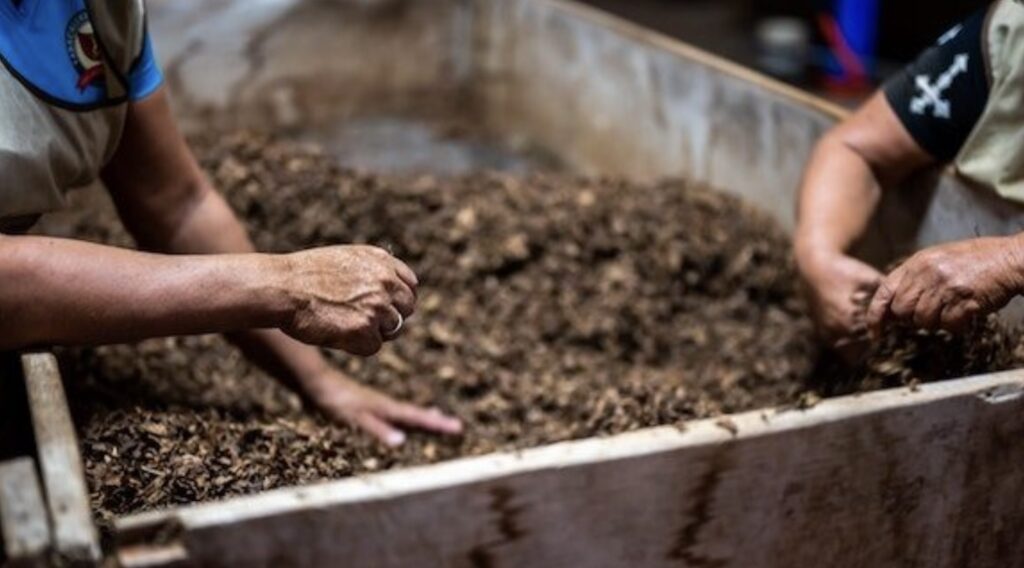
March 14, 2024, marks the commencement of the Community Composter Certification Course, a remarkable initiative led by Emily Hills, the director of Urban REAP. This comprehensive program aims to educate residents of McLennan County about composting, fostering a network of compost educators and advocates within the community. Participants will delve into topics such as soil and decomposition, composting science, and community outreach, culminating in the creation of independent projects aimed at spreading awareness about composting. By participating in this course, individuals can not only enhance their understanding of sustainable practices but also actively contribute to reducing organic waste in our community.
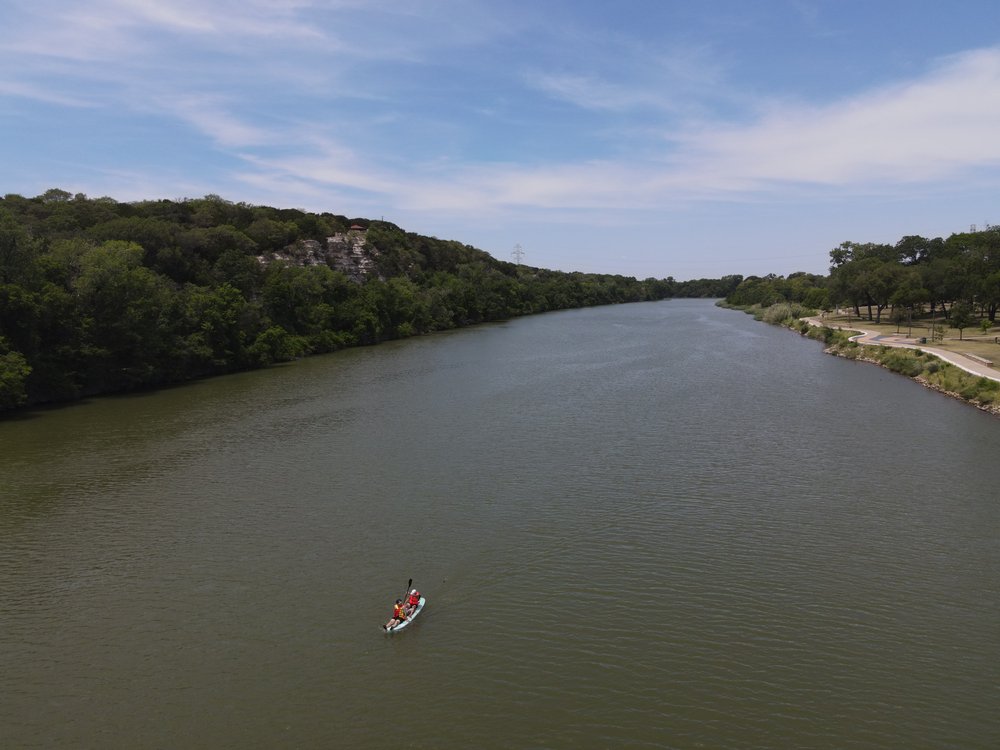
Just a few days after St. Patrick’s Day, on March 22, we celebrate World Water Day. This year, let’s engage as a community to address water-related issues and promote conservation efforts. Take part in the Brazos River Cleanup and help keep our waterways pristine from 10am – 1pm. After the cleanup, head over to Indian Springs Park for a range of educational and interactive activities. Our partners, including Keep Waco Beautiful, City of Waco Watershed Protection, and more, will offer fun for all ages. Enjoy yard games, kids’ activities, free giveaways, and delicious food and drinks!
Backyard Composting Workshop – March 16
Looking for practical ways to reduce waste and enrich your garden soil? Attend the Backyard Composting Workshop on March 16th and learn how to start your own composting system. Gain valuable insights into the composting process and see firsthand how you can turn kitchen scraps and yard waste into nutrient-rich compost for your garden.
Spring Plant Share & Garden Day – March 16

Get into the spirit of spring by joining your neighbors at the Spring Plant Share & Garden Day. Share and adopt new plants, gather seeds, and participate in activities to prepare the Butterfly Sanctuary Garden for the season ahead. Learn from Master Gardeners, contribute to volunteer activities, and support the local ecosystem by donating plants for butterflies, pollinators, and birds.
Household Hazardous Waste Day – March 23

After the celebrations wind down, take the opportunity to declutter responsibly by participating in the Household Hazardous Waste Collection Day on March 23. Safely dispose of potentially hazardous items, ensuring they don’t harm the environment or endanger our community.
Companion Planting Workshop – March 30
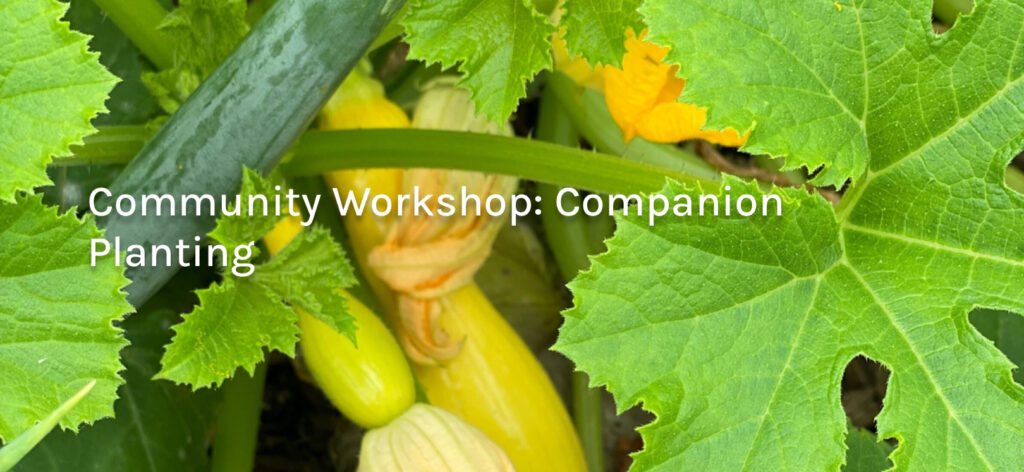
Wrap up the month of March by attending the Companion Planting Workshop on March 30th. Discover the benefits of planting companions that help each other thrive in your garden space. Learn valuable tips from garden guru April Strickland and maximize the productivity of your garden while promoting biodiversity.
This St. Patrick’s Day, let’s go green in more ways than one. By engaging in these events and adopting sustainable practices, we can make a meaningful difference for our community and the planet. Join the movement towards a greener, more environmentally conscious future. Happy St. Patrick’s Day!
Submitted by Melissa Mullins
Imagine a Day Without Water is a national day of action on Oct. 21 to raise awareness about the value of water. Have you ever thought about where your drinking water comes from? What about where your wastewater goes?
For the seventh annual day, we may take a few steps beyond imagining the reality of going without a resource as vital as water. We may take action by learning about the systems that deliver water to our homes and businesses each day.
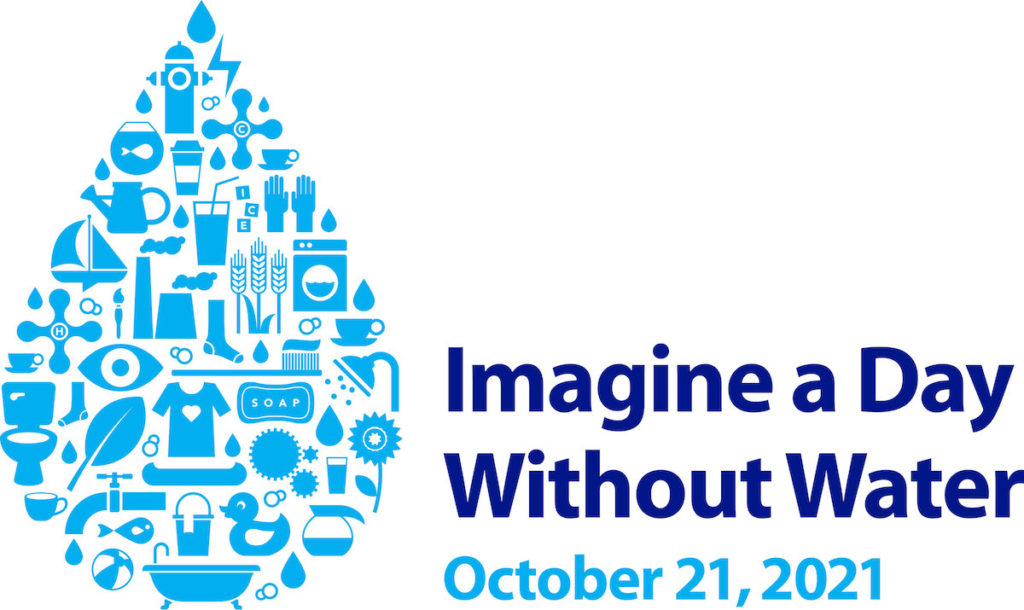
According to the 2021 Annual Value of Water Index, a majority of Americans across all demographics support a strong investment in our nation’s water infrastructure. A bipartisan agreement can be a rarity, but in this case most people agree that reliable water service and supply are crucial.
Meaningful investment in our water systems would provide access to quality water for everyone, resilient infrastructure, and more jobs. In fact, closing the water infrastructure investment gap would increase the GDP by $4.5 trillion over 20 years.
As an individual, you may wonder where you fit into ensuring a day without water doesn’t become a reality in our community. It’s a daunting task, but our collective voice can make a real and lasting impact.
Education is key. Take some time to learn about local water sources and what our water and wastewater utilities are doing to invest in our community. Consider joining like-minded people and reach out to decision makers and find where they stand on investing in water infrastructure.
Here in McLennan County and Greater Waco, you can:
- Contact us at the Center for Reservoir and Aquatic Systems Research if you are interested in partnering with us on activities such as community water festivals and community water forums or follow us on social media @bu_crasr.
- Join Keep Waco Beautiful or other groups such as Group W Bench Litter Patrol for a creek, river, or lake clean-up.
- Attend a monthly meeting (3rd Thursdays at 4 p.m.) of the Sustainable Resource Practices Advisory Board.
- Find out how to contact your local officials and when they meet at any of the 21 cities in McLennan County – what’s going on with water where you live?
- Read the annual drinking water quality report, learn how zebra mussels have been eradicated from Lake Waco and more at Waco Water Utility Services. If you live in another city, similar info should be available to you on that city’s website.
- Live in an unincorporated area of the county? Learn about water and sewer improvements and more at the McLennan County website.
No matter your reason for participating in Imagine a Day Without Water, continue the conversation with your friends, family, and co-workers about the value of water. A day without water doesn’t have to be inevitable. Let’s work toward a reality in which a day without water is something we only imagine.
For information on Imagine a Day Without Water and how you can participate, visit the event website.
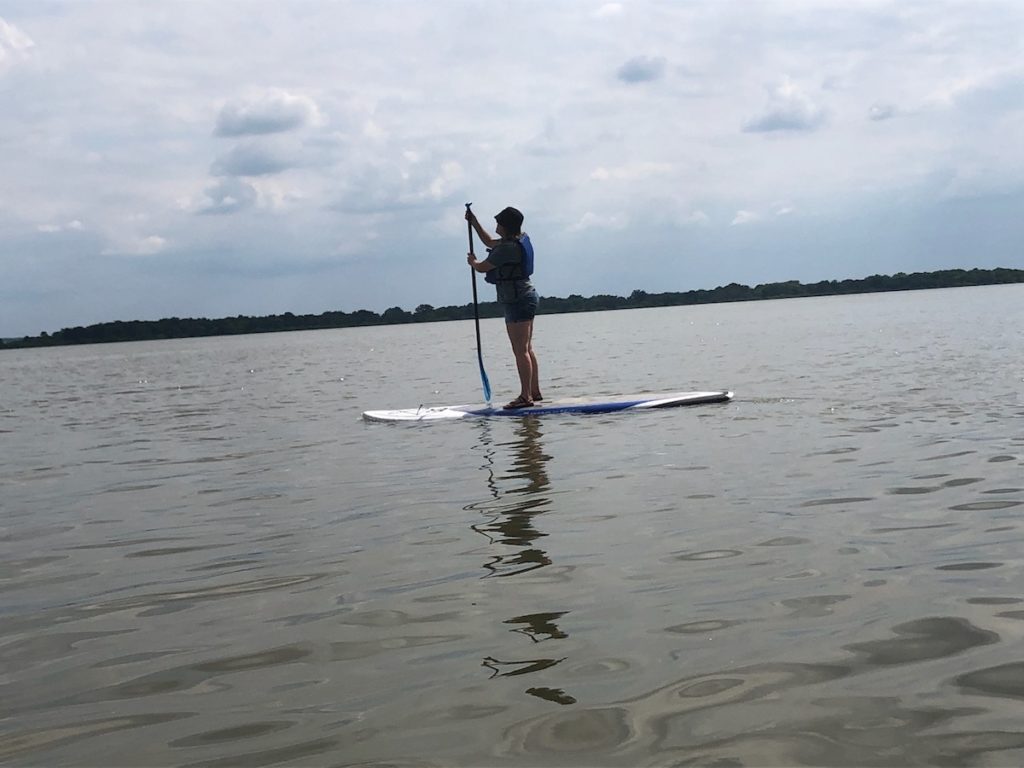
Melissa Mullins is environmental education specialist with Baylor University’s Center for Reservoir and Aquatic Systems Research.
The Act Locally Waco blog publishes posts with a connection to these aspirations for Waco. If you are interested in writing for the Act Locally Waco Blog, please email Ferrell Foster at ferrell@prosperwaco.org.
Drinking Water Week offers consumers an opportunity to recognize the hardworking people performing various roles ensuring tap water is “There When You Need It.” Drinking Water Week is May 2-8.

The City of Waco and partners throughout North America are observing Drinking Water Week by recognizing the vital role tap water plays in daily life, the infrastructure that is required to carry it to and from homes and businesses, and the important work of water professionals “behind the scenes.”
The City of Waco Water Utility Services Department’s staff of 150 water professionals is proud to serve the Waco community, ensuring the continuous delivery of safe, high quality drinking water to all customers.
Whether an engineer designing a capital project, an operator ensuring the safety and quality of drinking water, or a member of a pipe crew maintaining the infrastructure in our community, water professionals work around the clock to ensure tap water is there when you need it.
“The coronavirus pandemic continues to make evident the hard work performed by the people in the water sector,” said American Water Works Association CEO David LaFrance. “The work they are performing throughout the pandemic, often sacrificing time with their family, is nothing short of heroic. I am proud to be associated with them.”
“Throughout the pandemic, I’ve been proud of our employees here at the City of Waco,” said City Manager, Bradley Ford. “Particularly during the recent winter storm, Water Utility Services staff did an incredible job, working day and night in extreme circumstances, to keep our water system functioning. That work will be remembered for years to come.”
To commemorate the week, water utilities, water organizations, government entities, environmental advocates, schools, and others throughout North America and beyond encourage consumers to learn more about the importance of water and water infrastructure, especially in times of crisis.
About Drinking Water Week
For several decades, AWWA and its members have celebrated Drinking Water Week, a unique opportunity for both water professionals and the communities they serve to join in recognizing the vital role water plays in daily lives. Free materials for download and additional information about Drinking Water Week are available on the Drinking Water Week webpage.
By Melissa Mullins
Waco and the suburbs and rural areas in McLennan County are home to about 250,000 people. Our tap water comes from water sources such as Lake Waco and the Trinity Aquifer. Visitors contribute to our tourist economy and may experience the Brazos River downtown. Manufacturing and agriculture are both strong economic sectors for Greater Waco and depend on water. In fact, access to water and sanitation can be considered one of the most basic and fundamental human rights, no matter where you are in the world.
Although water may be a basic human right, here in the U.S. we can point to many examples involving water that demonstrate unfair treatment and access for people in our society. Exposure to lead contamination in drinking water in Flint, Michigan, in 2014 among mostly low-income and minority populations represents one of the best known recent examples of water-related environmental racism in our country.
Hurricane after hurricane in recent years, from Katrina to Harvey to most recently Laura, have shown that flooding disproportionately harms black neighborhoods, and the impacts of floods can exacerbate existing racial and social inequality. And, federal disaster money is not distributed fairly following disasters.
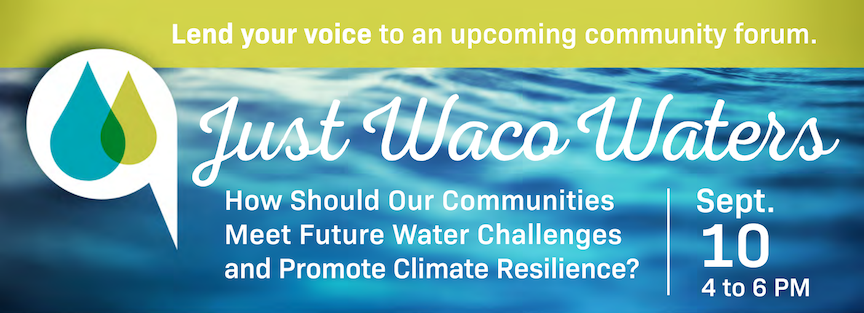
Here in Waco, we have fortunately not experienced a drinking water catastrophe like Flint, and we are too far inland to have major impacts from hurricanes. Many organizations are involved in planning to make sure that all water users in our community have water. However, population growth is expected to continue, and changes in the timing and intensity of precipitation events, flooding, droughts, and extreme heat are likely to be a part of future climate conditions. We may experience changes in water quantity and quality, as well as declining water infrastructure (such as dams, pipes, and treatment facilities).
Our priorities in 2020 have, rightly, been centered on the global coronavirus pandemic, and you may be thinking that issues like water planning can take a backseat. But this year has only highlighted the fact that impacts from the pandemic, like climate impacts and other environmental impacts, are not fair and are not felt equally by all people.
Deaths from COVID19 are much higher among people of color than among whites, and for many, COVID19 has increased the sense that environmental racism and climate change are inextricably linked. The Black Lives Matter movement has named environmental conditions as one of their top concerns for 2020, and 2020 saw a relaunch of the National Black Environmental Justice Network. Water issues are not only environmental issues, they are part of the larger context of our current social and economic realities.
Talking about issues like water, the environment, climate, justice, and economic inequalities can be difficult. How can we all come to the table and engage around these issues in our community?
This summer, the Mayborn Museum and the Center for Reservoir and Aquatic Systems Research at Baylor University received input via surveys and online meetings from people in the Waco community regarding their concerns about water in the future. As an outcome, the Just Waco Waters Forum will be hosted by Mayborn Museum online 4-6 p.m. Sept 10, and you are invited.
The Just Waco Waters Forum has a great line-up of speakers including the Rev. Vernon K. Walker, with Communities Responding to Extreme Weather in the Boston area, as well as local speakers.
Participants will work in small, facilitated groups to voice their thoughts on what we can do to prepare for Waco’s future water challenges. You can register here – space is limited, but all residents of Waco and McLennan County are welcome.
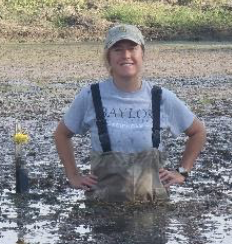
Melissa Mullins is a water educator with the Center for Reservoir and Aquatic Systems Research at Baylor University. Along with a partner from the Mayborn Museum, she is a fellow in the pilot program of the 2020 Public Interest Technology Community Innovation Fellowship. The program trains science-engagement professionals to collaborate with local civic, government, and university partners to engage the public on issues that matter to their local communities.
The Act Locally Waco blog publishes posts with a connection to these aspirations for Waco. If you are interested in writing for the Act Locally Waco Blog, please email ashleyt@actlocallywaco.orgfor more information.
by Alan D. Northcutt, Waco Friends of Peace
Like most Wacoans, I used to purchase bottled water periodically. But then I learned the truth about this product:
- In the U.S. tap water is safe and is subject to more stringent federal regulations and inspections than bottled water.
- About half of bottled water brands are simply municipal tap water, but cost up to 1000 times the price of tap water.
- At a time when droughts are widespread, 3 liters of water are required to produce 1 liter of bottled water.
- The production and transportation of one bottle of water requires energy equivalent to the oil of a one quarter filled bottle. This process added 2.5 million tons of CO2 to the atmosphere in 2006.
- 75% of water bottle plastic ends up in landfills, lakes, streams and oceans, and requires centuries to decompose.
- The planet’s oceans are contaminated by five gigantic circulating patches of plastics and microplastics, the largest covering 500,000 square miles.
- Because animals mistake plastic for food, annually an estimated 1 million seabirds and 100,000 marine mammals die from plastic, and 2/3 of our fish stocks ingest plastic.
Since I became aware of these facts I have never purchased bottled water. We can all easily take steps to conserve precious natural resources while protecting the biosphere and its inhabitants by drinking water in reusable metal or reusable BPA-free plastic containers. I believe bottled water should be reserved for natural disasters and other emergency situations only.
 This week’s blog is by Alan D. Northcutt. Alan has lived in Waco for 28 years. He is a physician specializing in skin pathology. He has been active in the anti-war movement since college days, and heads the Waco Friends of Peace. Alan believes the most important issue facing mankind is climate change, which has become the primary focus of Friends of Peace. If you would be interested in writing for the Act Locally Waco blog, please contact Ashley Thornton by email at ashleyt@actlocallywaco.org.
This week’s blog is by Alan D. Northcutt. Alan has lived in Waco for 28 years. He is a physician specializing in skin pathology. He has been active in the anti-war movement since college days, and heads the Waco Friends of Peace. Alan believes the most important issue facing mankind is climate change, which has become the primary focus of Friends of Peace. If you would be interested in writing for the Act Locally Waco blog, please contact Ashley Thornton by email at ashleyt@actlocallywaco.org.
